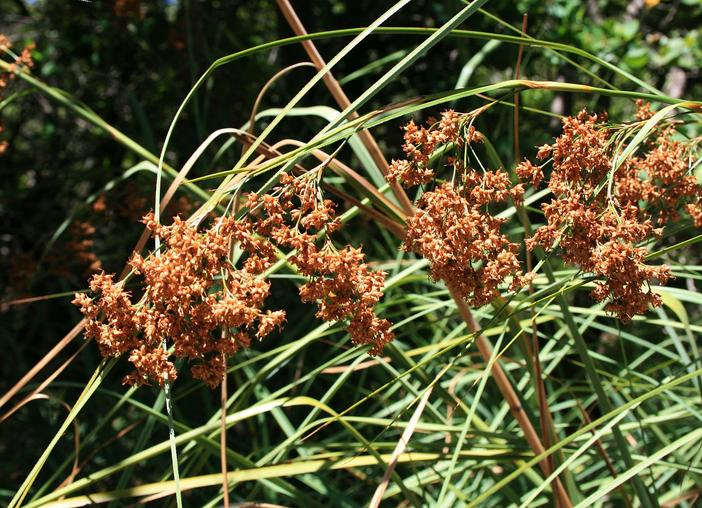Sawgrass
(Cladium mariscus subsp. jamaicense)
Sawgrass (Cladium mariscus subsp. jamaicense)
/
/

Franz Xaver
CC BY-SA 4.0
Image By:
Franz Xaver
Recorded By:
Copyright:
CC BY-SA 4.0
Copyright Notice:
Photo by: Franz Xaver | License Type: CC BY-SA 4.0 | License URL: https://creativecommons.org/licenses/by-sa/4.0 | Uploader: Franz Xaver | Publisher: Wikipedia Commons




























Estimated Native Range
Summary
Cladium mariscus subsp. jamaicense, commonly known as sawgrass, is a perennial sedge native to freshwater marshes, wet prairies, and the Everglades in the southeastern United States and the tropical Americas. It is a key species in the Everglades ecosystem, where it forms extensive monotypic stands. This plant can grow up to 10 feet (3 meters) tall, with long, narrow, and sharply serrated leaves that can cut skin, hence the name "sawgrass." It produces brownish spikelets on tall stems that are not particularly showy, but are characteristic of the species. Sawgrass blooms from spring to summer.
Sawgrass is valued for its role in water filtration and soil stabilization in its native habitat. It is not commonly used in ornamental horticulture due to its sharp leaves and large size, but it may be utilized in naturalized plantings or for ecological restoration projects. Sawgrass thrives in full sun and requires constant moisture or even inundation, making it suitable for wetland or water garden settings. It is adapted to a range of soil types, from sandy to heavy clay, as long as they are wet. There are no popular garden cultivars of this subspecies. Potential problems include its aggressive growth habit, which can make it invasive outside its native range. It can also be difficult to manage due to its sharp leaves.CC BY-SA 4.0
Sawgrass is valued for its role in water filtration and soil stabilization in its native habitat. It is not commonly used in ornamental horticulture due to its sharp leaves and large size, but it may be utilized in naturalized plantings or for ecological restoration projects. Sawgrass thrives in full sun and requires constant moisture or even inundation, making it suitable for wetland or water garden settings. It is adapted to a range of soil types, from sandy to heavy clay, as long as they are wet. There are no popular garden cultivars of this subspecies. Potential problems include its aggressive growth habit, which can make it invasive outside its native range. It can also be difficult to manage due to its sharp leaves.CC BY-SA 4.0
Plant Description
- Plant Type: Grass
- Height: 3-10 feet
- Width: 2-2.5 feet
- Growth Rate: Moderate
- Flower Color: N/A
- Flowering Season: Summer
- Leaf Retention: Evergreen
Growth Requirements
- Sun: Full Sun, Part Shade
- Water: High, Aquatic
- Drainage: Slow, Standing
Common Uses
Erosion Control, Water Garden
Natural Habitat
Freshwater marshes, wet prairies, and the Everglades ecosystem in the southeastern United States and the Caribbean
Other Names
Common Names: Sawgrass , Bracken Fern , Jamaica Swamp Sawgrass , Uki , Jamaican Sawgrass
Scientific Names: Cladium mariscus subsp. jamaicense , Cladium bahiense , Cladium effusum , Cladium elevatus , Cladium jamaicense , Cladium leptostachyum , Cladium mariscus subsp. ferruginescens , Cladium mariscus var. ferruginescens , Cladium occidentale , Cladium occidentale
GBIF Accepted Name: